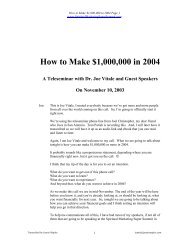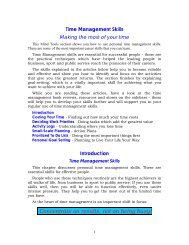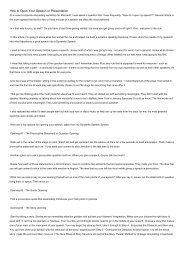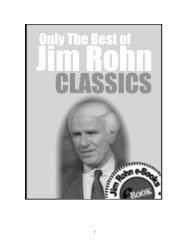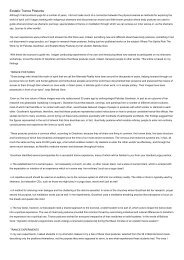Executive Coaching - A Guide For The HR Professional.pdf
Executive Coaching - A Guide For The HR Professional.pdf
Executive Coaching - A Guide For The HR Professional.pdf
Create successful ePaper yourself
Turn your PDF publications into a flip-book with our unique Google optimized e-Paper software.
180 EXECUTIVE COACHING<br />
............................<br />
• Responsibilities to your boss and <strong>HR</strong> person<br />
• Coachable moments<br />
• Permission to speak up<br />
Why Use a Coach?<br />
You, the client, play the central role in the coaching story. We<br />
assume you’ve never been a coaching client before, so in this section<br />
we examine your role in helping to ensure the success of the<br />
coaching relationship.<br />
Something in the way of a business challenge probably is causing<br />
the need for you to learn some new behaviors quickly. This challenge<br />
may appear as a change in the nature or scope of work, an<br />
assignment to turn around or fix a business, or a global or international<br />
assignment with a high level of complexity and ambiguity in<br />
it. Usually these challenges occur in clusters, possibly creating<br />
thoughts such as “It just never stops” or “I might be in over my head”<br />
or even “What am I supposed to do now?” Whatever it is, there is a<br />
need to ramp up quickly and accelerate the learning curve.<br />
<strong>The</strong>re are lots of ways to learn. Our early educational lives were<br />
typically dominated by “instruction” in one form or another. As we<br />
grow into adulthood, trial and error becomes perhaps the most common<br />
learning method. We also learn by reading about what others<br />
have done, watching what others do, or occasionally by going to<br />
formal classes. Personal coaching is also a learning alternative.<br />
<strong>Coaching</strong> tends to be most appropriate when:<br />
• Performance makes an important difference to the<br />
employer. Almost by definition, the contributions<br />
expected of senior executives fall into this category.<br />
Managers at other levels who are in especially<br />
significant roles also are responsible for making an<br />
<strong>Executive</strong> <strong>Coaching</strong>. Copyright © 2005 by John Wiley & Sons, Inc. Reproduced by<br />
permission of Pfeiffer, an Imprint of Wiley. www.pfeiffer.com






